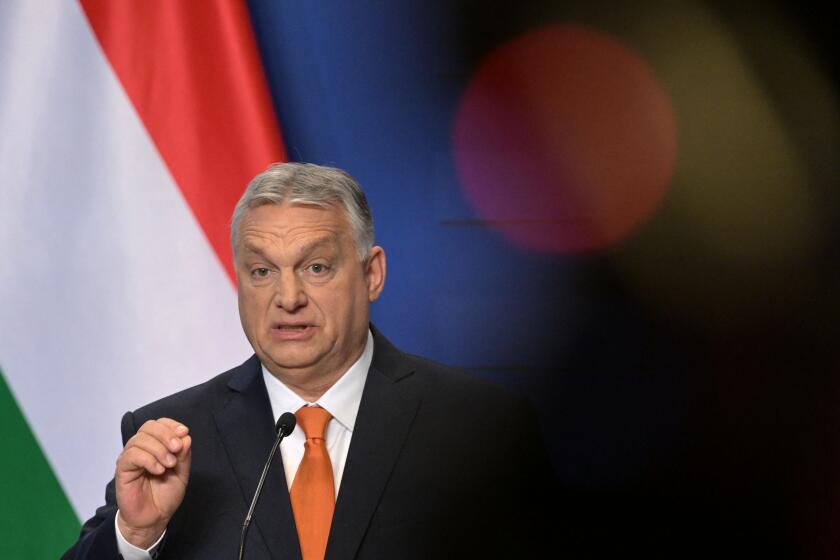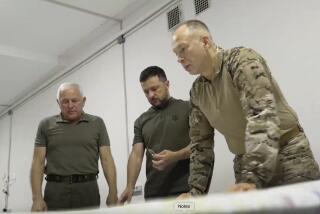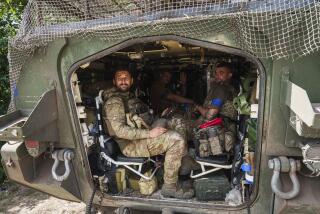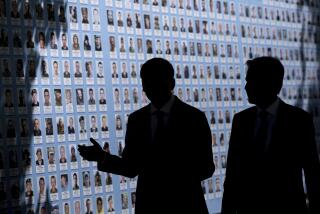As Zelensky forecasts ‘hard battle’ in Ukraine’s east, Britain’s prime minister pays him a visit
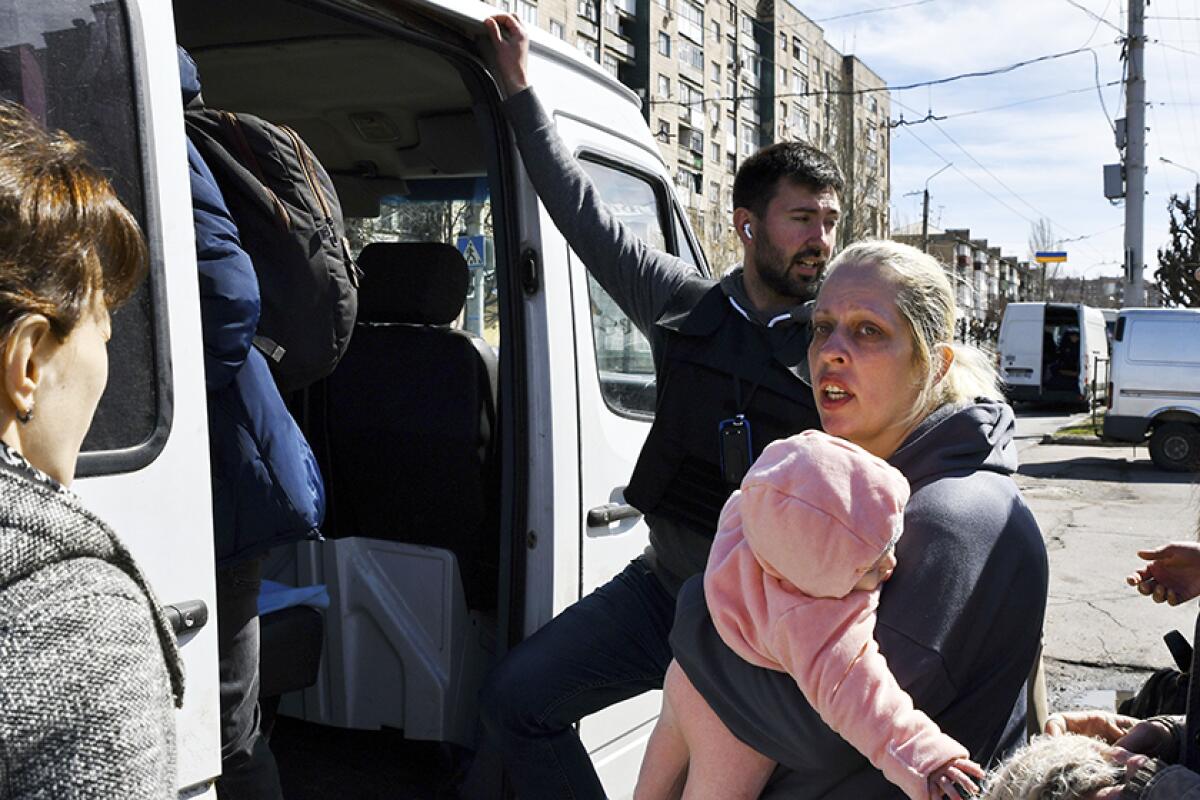
- Share via
KYIV, Ukraine — Amid signs that atrocities and fighting were likely to intensify as the war in Ukraine continued in its seventh week, President Volodymyr Zelensky on Saturday warned of a “hard battle” ahead, with Russian forces amassing in the east for a new offensive.
Thousands of terrified civilians were fleeing the eastern Donbas region, expected to be the next major battleground after Russia shifted its focus to consolidating its control in the places it already occupies. More than 50 civilians attempting to escape the region were killed in what Ukraine has said was a Russian missile strike on a crowded train station on Friday.
Also Saturday, as European diplomats and officials began to make tentative returns to Kyiv, British Prime Minister Boris Johnson paid an unannounced visit to the capital. The British government said it was supplying Ukraine for the first time with anti-ship missile systems, which could help Zelensky’s forces counter shelling in southern cities from Russian navy vessels in the Black Sea and Sea of Azov.
The new assistance package, which also includes financial aid, “is a testament of our commitment to his country’s struggle against Russia’s barbaric campaign,” Johnson said on Twitter after the meeting with Zelensky.
In video posted by Ukrainian officials, Johnson can be seen barreling up to Zelensky outdoors in a Kyiv plaza, repeatedly asking, “How are you?” Zelensky responds: “You know how I am!”
“You are an absolute hero,” Johnson says as the two vigorously shake hands. The pair proceed to walk through the streets, greeting the small number of residents who ventured outdoors, before ending up at presidential offices for a face-to-face talk under their countries’ flags.
In a news conference alongside Austrian Chancellor Karl Nehammer earlier in the day, Zelensky declared: “We believe in this fight and our victory.”
In addition to the British and Austrian leaders, the prime ministers of Poland, Slovenia and the Czech Republic have visited Kyiv, as did senior officials of the European Union, which reopened its embassy on Saturday. No senior officials of the Biden administration have come to Kyiv since the invasion began on Feb. 24.
In a sign of Russia’s struggles in conducting its offensive — and possibly a hint of its strategy to come — Moscow put a new military general in charge of the operation, the BBC reported, citing unnamed Western sources.
Gen. Alexander Dvornikov has a reputation as a ruthless commander after leading Russia’s scorched-earth campaign in Syria that Western officials said indiscriminately targeted civilians and was credited with turning the long-raging civil war in favor of Syrian dictator Bashar Assad.
Until now, command of the Russian operations in Ukraine has been centralized in Moscow, possibly explaining what experts describe as glaring failures in logistics, supply chains
and on-the-ground morale among Russian troops.
Amid a wave of international condemnation and fresh sanctions, Russia has denied responsibility for the missile strike in the city of Kramatorsk on Friday that Ukrainian officials said killed at least 52 people.
But Western military officials affirmed that Moscow’s forces were behind the train station attack. The Pentagon said it believes the weapon was an SS-21, which is the NATO designation for a Tochka short-range ballistic missile variant, according to a senior Defense Department official.
Zelensky warned in an overnight address that those responsible for the railway strike, at all levels of planning, would face consequences.
“This is another war crime of Russia, for which everyone involved will be held accountable,” he said.
Ukrainian officials also continue to painstakingly document gruesome forensic evidence of atrocities against civilians in areas close to Kyiv, which Russian forces occupied for about a month before breaking off a failed bid to capture the city. Ukraine’s assertions received strong backing from senior EU officials who had inspected a mass grave and other sites in the city of Bucha and pronounced that the “unthinkable” had taken place.
Emboldened by a crushing win at the polls, Hungary’s Putin-friendly leader could crack the West’s united front over Ukraine. Is that his aim?
The relative calm in the capital region contrasted with a growing sense of alarm and imminent danger in the country’s separatist Donbas region in the east.
Following the devastating bombardment in Kramatorsk, which left crumpled bodies strewn across the station platforms, Ukraine’s national railway service was ferrying people away from the area as quickly as possible, using nearby cities as jumping-off points for the exodus.
Despite fears that civilians trying to escape the east would again be targeted, Ukrainian officials repeated appeals to noncombatants to flee if they could.
The mayor of Kramatorsk, Oleksandr Honcharenko, said Saturday that evacuation buses would transport people to neighboring cities including Sloviansk, where they could catch trains bound to safer parts of the country.
“The railways do not
halt the task of taking everyone to safety,” the railway operator said in a statement on the messaging app Telegram. Departures would continue from stations in the Donetsk and Luhansk regions, it said. Keeping the rail system operational during the war has been a point of pride for Ukrainians.
The next phase of fighting is likely to increase in ferocity, Western officials said. At the Pentagon on Friday, a senior U.S. official forecast a metaphorical “knife fight,” saying combat would be “very bloody and very ugly.”
There were growing indications that Russia was laying the groundwork for redoubled combat in the east with strikes on Ukrainian military infrastructure.
Russia’s military said Saturday that its forces had destroyed an ammunition depot at the Myhorod air base in Ukraine’s central-eastern Poltava region and claimed to have wrecked a Ukrainian fighter jet and helicopter in the strike. A Russian Defense Ministry spokesman was quoted by the Interfax news agency as saying another ammunition depot was taken out near the city of Novomoskovsk.
With up to a fifth of Russia’s initial invading force thought to have been incapacitated, Russian President Vladimir Putin appears determined to seize strategic chunks of Ukraine, including the eastern industrial heartland and parts of the southern coast, in order to portray the invasion as a victory, analysts said.
At home, Putin has moved to crush dissent and criminalize antiwar activity. The Justice Ministry said it had revoked the registrations of a dozen international organizations including the rights groups Amnesty International and Human Rights Watch. The groups vowed to carry on their work.
About a quarter of Ukraine’s 44 million people have been displaced from their homes, and more than 4 million have fled to neighboring countries. In Warsaw on Saturday, European Commission President Ursula von der Leyen said a global pledging event for refugees of the war in Ukraine had raised $11 billion.
Meanwhile, Ukraine’s deputy prime minister, Iryna Vereshchuk, reported fresh efforts Saturday to help civilians leave the besieged southern port of Mariupol by private transport. The city has been savaged by Russian airstrikes since the first days of the war.
Ukrainian officials for weeks have cited reports that Moscow, in the guise of a humanitarian intervention, has been spiriting Mariupol evacuees away to Russia.
On Saturday, Russia’s RIA news agency quoted the Defense Ministry as saying dozens of people had been “taken to safe places” from the city on Friday.
More than 30,000 people have been “illegally deported” to Russia from Mariupol, Ukrainian officials say.
Control of Mariupol is considered a particular prize for Russia, because capturing the city would allow the creation of a land corridor from Russia and territories it controls to the Crimean peninsula, which Russia seized eight years ago.
Ukrainian forces have “continued to hold out against Russian assaults” in parts of southwestern and eastern Mariupol, according to a report late Friday from the Institute for the Study of War, a Washington-based think tank.
Russian naval forces have been launching cruise missiles to support military operations around Mariupol, on the Sea of Azov, and Mykolaiv, near the Black Sea, British military intelligence said in an assessment Saturday.
Despite denials from Moscow that it deliberately targets noncombatants, British officials said Russia was continuing its attacks on civilians and would likely conduct more strikes like the one in Kramatorsk.
McDonnell reported from Kyiv, King from Budapest, Hungary, and Wilkinson from Washington.
More to Read
Sign up for Essential California
The most important California stories and recommendations in your inbox every morning.
You may occasionally receive promotional content from the Los Angeles Times.
